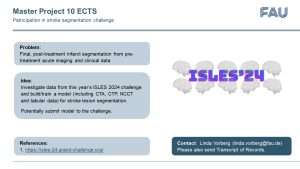Index
Improved few-shot localization in Chest X-Rays (CXRs)
Oriented Bounding Box Detection of Metallic Objects in X-Ray Images
Screw Detection in X-Ray Images using Detection Transformer Networks
DETR3D for Direct Regression of Object Pose from Multi-View Fluroscopy Images
Time Series Calving Front Snakes
Artifacts Simulation in CT Images
Introduction:
Computed Tomography (CT) is a powerful imaging modality, but its images often suffer from artifacts that can obscure crucial diagnostic information. Physics-informed artifact simulation offers a promising solution by realistically modeling artifact generation based on underlying physical principles. This approach enables improved artifact understanding, provides realistic training data for machine learning algorithms, and allows for robust evaluation of artifact correction techniques.
This project will focus on exploring state-of-the-art techniques for simulating various types of CT artifacts and investigating their impact on image quality. We will assess the potential of utilizing these simulations to develop advanced artifact reduction methodologies. By further researching this cutting-edge field, we hope to contribute to the continuous improvement of the accuracy and reliability of CT imaging.
Requirements:
- Completion of Deep Learning is mandatory.
- Proficiency in PyTorch is essential.
- Strong analytical and problem-solving skills.
Prospective candidates are warmly invited to send their CV and transcript to yipeng.sun@fau.de.
Evaluation of Reference-Free Registration Methods for Dynamic Vascular Roadmaps
Evaluation of the novel class of promptable image segmentation foundation models for radiotherapy tumor autosegmentation
Enhancing Inference Efficiency of Deep Learning Models for Camera-Based Road Segmentation
ISLES Challenge 2024: Infarct segmentation from CT images

Final, post-treatment infarct segmentation from pre-treatment acute imaging (CT) and clinical data.
Idea: Investigate data from this year’s ISLES 2024 challenge and build + train a model for stroke lesion segmentation. Potentially submit the model to the challenge.
Reference: https://isles-24.grand-challenge.org/